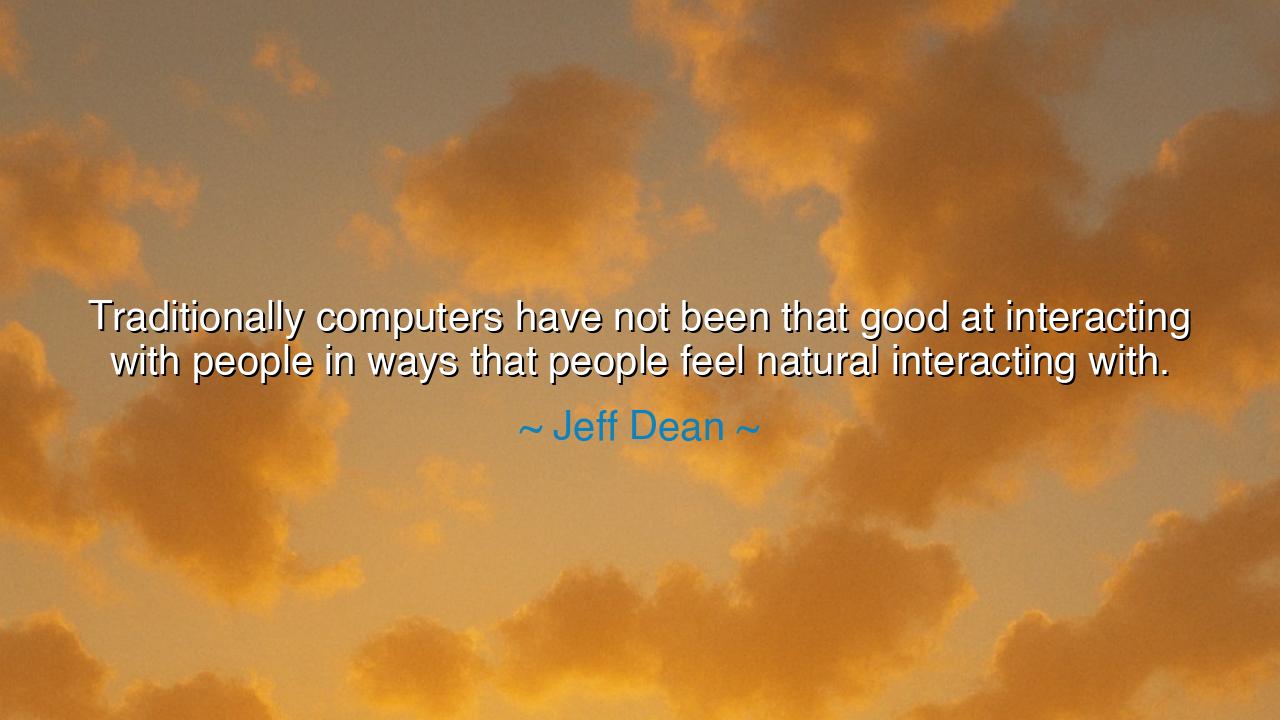
Traditionally computers have not been that good at interacting
Traditionally computers have not been that good at interacting with people in ways that people feel natural interacting with.






The words of Jeff Dean — “Traditionally computers have not been that good at interacting with people in ways that people feel natural interacting with.” — echo like a reflection upon humanity’s long pursuit of understanding its own creations. Beneath their calm and technical phrasing lies a profound truth about the relationship between man and machine, between the warmth of human expression and the cold precision of logic. Dean, one of the great architects of modern computing, speaks not merely of programming or systems, but of a deeper longing — the desire to make our inventions understand us not as commands, but as conversation, not as input, but as intimacy.
In the wisdom of the ancients, there is an old saying: “That which man creates in his image must first learn to mirror his heart.” For centuries, humans have built tools to extend their strength — fire for warmth, wheels for movement, and machines for labor. Yet, as Dean observes, when it came to understanding the human mind and emotion, these creations stood silent. Computers, born of mathematics and logic, could calculate the stars yet stumble over the softness of speech. They could store endless knowledge, yet fail to grasp a sigh, a smile, a pause. His words remind us that technology’s greatest challenge has never been power — it has been empathy.
The origin of Dean’s insight lies in his lifelong work at the frontier of artificial intelligence. As a leader at Google, he helped craft the very frameworks — from neural networks to deep learning systems — that taught computers to see, hear, and respond. He witnessed firsthand the evolution from mechanical computation to machine learning, where programs began to learn not through instruction, but through experience. Yet even amidst these triumphs, he recognized the enduring gap: that despite their brilliance, computers did not yet “feel natural.” They could imitate speech but not conversation, translate words but not meaning. His quote, then, is both an observation and a prophecy — that the true measure of intelligence is not in logic alone, but in connection.
Consider the story of Alan Turing, the father of modern computing. In the mid-20th century, Turing conceived the idea of machines that could think — but he also foresaw the difficulty of making them understand. His famous “Turing Test” was not about computation, but communication: could a machine converse with a human so naturally that the human would not know the difference? For decades, this goal seemed distant, like a mirage at the edge of science. But it was Turing’s dream — and now Dean’s reality — that one day machines might not just process human words, but truly respond in human ways.
In Dean’s words, we sense both admiration and caution. For what he describes is not a failure of technology, but a challenge of perspective. Computers were made to serve, not to feel; to compute, not to comprehend. Yet as humanity poured more of itself into code — teaching machines to learn, to reason, even to create — a mirror began to form. The question was no longer whether machines could think, but whether they could understand what it means to be human. In that question lies the moral and spiritual weight of his observation.
There is beauty, too, in the humility of his statement. It acknowledges that progress is not perfection — that humanity is still learning to teach its own creations how to listen, to empathize, to respond with grace. The ancients might have called this the journey from craft to wisdom — for only when the craftsman imbues his creation with compassion does the creation become complete. And so, in this modern age, engineers have become philosophers, designing not only machines that work, but machines that understand.
So, my children, learn from this: the future of technology is the future of humanity’s reflection upon itself. As you build and as you dream, remember that the goal is not to make machines more human, but to make humanity more humane through its machines. Seek not only to perfect code, but to perfect compassion in what you create. Let your inventions speak not only with intelligence, but with kindness. For when technology learns to understand the heart as well as the mind, then — and only then — will it truly feel natural.
Thus, Jeff Dean’s words stand as a milestone in the great chronicle of invention — a reminder that the journey of computing is not about surpassing human thought, but honoring human nature. When the cold precision of circuits meets the warmth of empathy, when data learns to speak with soul, then our creations will cease to be tools and become companions — reflections of the divine curiosity that gave birth to them. And in that union, humanity will not lose itself to its machines, but find itself anew.






AAdministratorAdministrator
Welcome, honored guests. Please leave a comment, we will respond soon